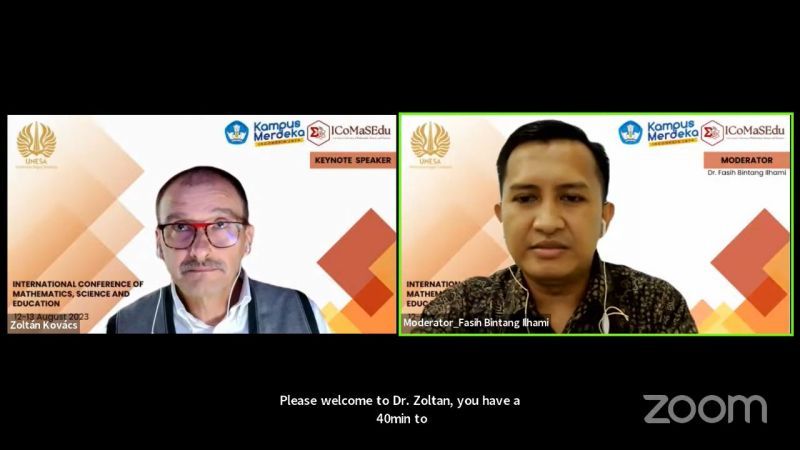Climate Change Highlighted by Experts from Various Countries at ICoMaSEdu

Unesa.ac.id, SURABAYA-Climate change that has occurred recently has become a concern for various parties in various countries. The phenomenon requires crucial and strategic steps. That issue was one of those discussed in the International Conference of Mathematics, Science, and Education (ICoMaSEdu) held by the Faculty of Mathematics and Natural Sciences (FMIPA), Surabaya State University (UNESA) online, Saturday, August 12, 2023.
ICoMaSEdu is an annual international conference held since 2017 with coverage of the fields of mathematics, science, education and informatics. The theme this time was “Reinforcing Collaborative Research in Mathematics, Science, and Education to Promote Innovation and Productivity”.
The conference was attended by five international experts in related fields who were also speakers at the event. They were Dr. Eko Hariyono, M.Pd. from UNESA, Prof. Dr. Satoru Nakashima from Hiroshima University Japan, Prof. Sir Martyn Poliakoff from Nottingham University UK, Prof. Dr. Peter C. van Welzen from Naturalis Biodiversity Center Netherlands, and Dr. Zoltan Kovacs from Debrecen University, Hungary.
Eko Hariyono revealed that Indonesia has witnessed several frequent natural disasters. In the past two years, there have been dramatic changes in natural systems. In other words, climate change has altered the pattern of natural disasters, presenting profound challenges for regions in Indonesia.
He continued, in the last 17 years several parameters show global warming has increased, such as temperatures that have increased by 12% to sea water rise by 151%. To reduce the increase in global warming, he emphasized on educational research that is in line with sustainable development goals.
In its application in education, the modification of the ability of science teachers must be equipped with the competence of change in sustainable development. Of course, this encourages student literacy and awareness when learning science.
In his research, he encouraged educational institutions to build climate change action. Teachers in secondary schools can implement several actions such as utilizing land for hydroponics, building nutritious food consumption habits, and other biotechnologies. These are small efforts that can be instilled in reducing climate change that is getting worse.
Meanwhile, in the field of education, Zoltan Kovacs stated that the education system in several countries remains limited to merely listening to theories—even in the context of climate change education. According to him, active learning should involve discussion activities that emphasize higher-order thinking, as well as incorporate group work.
There are two contexts that must operate simultaneously, namely active learning and active teaching. Unlike active learning, which prioritizes the content, active teaching rests on the principle that students should discover the formulation of problems within a given situation.
“For example, in mathematics education, the number 10 does not necessarily have to be obtained by calculating 5 + 5; it can also be achieved using other numbers—or even by subtracting a negative number from a positive one,” he explained.
On that occasion, Prof. Dr. Hj. Siti Nur Azizah, S.H., M.Hum., Vice Rector for Planning, Development, Cooperation, and Information and Communication Technology, was also present. She stated that the exchange of ideas through such activities plays an important role in addressing today’s global crisis.
By sharing the ideas discussed, it is hoped that holistic and effective solutions can be created. “Innovation and research are key pillars in meeting challenges through the best ideas that have the potential to transform the world into a more sustainable and secure place,” she said.
***
Reporter: Muhammad Dian Purnama
Editor: @zam Alasiah*
Photo: Documentation by the Public Relations Team
Share It On: